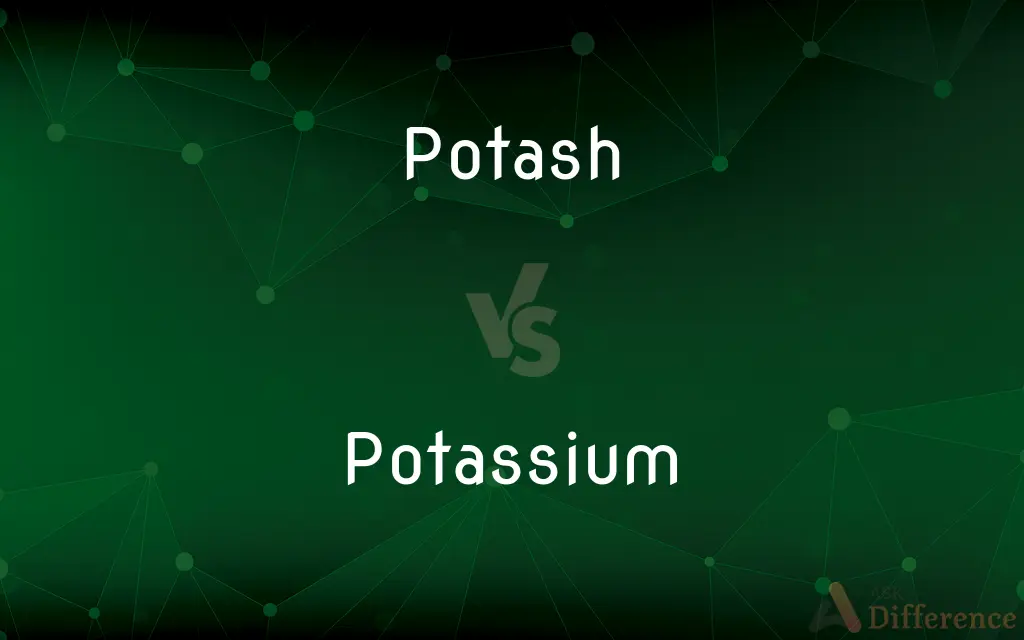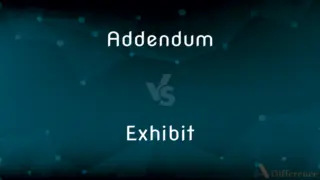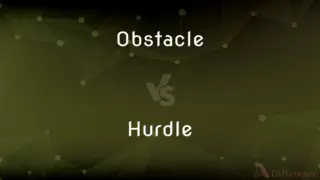Potash vs. Potassium — What's the Difference?
By Maham Liaqat & Fiza Rafique — Updated on February 26, 2024
Potash is a potassium containing mineral used primarily in fertilizers, while potassium is a chemical element essential for plant and animal life.

Difference Between Potash and Potassium
Table of Contents
ADVERTISEMENT
Key Differences
Potash, historically known as potassium carbonate, is derived from ash of plants and is used extensively in agriculture as a soil fertilizer. Potassium, on the other hand, is a soft, silvery-white metal, classified as an alkali metal and is crucial for biological functions in both plants and animals.
The production of potash involves the extraction and refinement of potassium salts from underground deposits. This contrasts with the isolation of potassium metal, which requires electrolysis of potassium salts due to its high reactivity with water.
Potash specifically refers to potassium compounds and potassium-bearing materials used as fertilizer in agriculture. Potassium as an element plays a vital role in plant growth, water uptake, and photosynthesis.
Potash is commercially important for its potassium content, pure potassium has wide applications in industry, including as a heat transfer medium and in the manufacture of soaps and glass.
The term "potash" encompasses a variety of potassium salts, including potassium chloride (KCl), potassium sulfate (K2SO4), and potassium nitrate (KNO3). Potassium, in its elemental form, is rarely found in nature due to its reactivity and is usually bound in mineral compounds.
ADVERTISEMENT
Comparison Chart
Definition
A potassium-containing mineral used in fertilizers.
A chemical element, symbol K, essential for biological life.
Primary Use
Fertilizer in agriculture.
Essential nutrient, industrial applications.
Form
Various potassium salts (KCl, K2SO4, KNO3).
Soft, silvery-white metal.
Production Method
Extracted and refined from underground deposits.
Obtained by electrolysis of potassium salts.
Role in Agriculture
Used as a source of potassium for plant nutrition.
Necessary for plant growth, water regulation, photosynthesis.
Compare with Definitions
Potash
Sold in various forms including granules and powder.
The gardener bought a bag of granular potash.
Potassium
A chemical element with symbol K.
Potassium reacts violently with water.
Potash
A term historically referring to potassium carbonate.
Potash was once produced from the ashes of plants.
Potassium
Used in industries, like making glass and soap.
Potassium is used in glass manufacturing for its properties.
Potash
Extracted from earth as potassium salts.
Potash mining is crucial for fertilizer production.
Potassium
Found in nature only in compound forms.
Potassium chloride is mined for various applications.
Potash
Enhances water retention and disease resistance in plants.
Regular potash application helps in drought times.
Potassium
Essential for muscle function and nerve signals in animals.
Bananas are a good source of potassium.
Potash
A class of potassium minerals, of similar applicability to potassium carbonate, such as being a fertilizer. (ie. potassium chloride, potassium hydroxide)
Potassium
Key for plant growth and photosynthesis.
Potassium deficiency in plants leads to yellow leaves.
Potash
A potassium-rich mineral used as fertilizer.
The farmer applied potash to improve crop yield.
Potassium
Potassium is a chemical element with the symbol K (from Neo-Latin kalium) and atomic number 19. Potassium is a silvery-white metal that is soft enough to be cut with a knife with little force.
Potash
To treat with potassium.
Potash
The hydroxide of potassium hydrate, a hard white brittle substance, KOH, having strong caustic and alkaline properties; - hence called also caustic potash.
Potash
A potassium compound often used in agriculture and industry
Common Curiosities
Can potash be used in food?
Potash (as potassium carbonate) can be used in food processing, though it's mainly known for its use in fertilizers.
What is potassium and where is it found?
Potassium is a chemical element, essential in biological systems, found in nature only in compound forms.
How is potash produced?
Potash is produced by extracting and refining potassium salts from underground deposits.
Is potassium safe to handle?
Elemental potassium is highly reactive, especially with water, and must be handled with caution.
How does potash affect soil?
Potash improves soil fertility by providing essential potassium for plant nutrition.
Can I find potassium in everyday foods?
Yes, potassium is found in many foods, including fruits, vegetables, and meat.
What is potash used for?
Potash is primarily used as a fertilizer in agriculture to supply potassium.
Why is potassium important for plants?
Potassium is vital for plant growth, aiding in water uptake, and photosynthesis.
What are the differences between potash and potassium fertilizers?
Potash fertilizers contain potassium in salt form, while potassium fertilizers refer to any fertilizer type that delivers potassium.
Are there environmental impacts from potash mining?
Potash mining can have environmental impacts, including water usage and habitat disruption.
How is potassium extracted for industrial use?
Potassium is typically extracted through the electrolysis of potassium salts.
Is potash only used in agriculture?
While its primary use is in agriculture, potash is also used in some industrial processes.
Why is potassium reactive with water?
Potassium's reactivity with water is due to its position in the alkali metal group, having a single electron in its outer shell.
What happens if plants don't get enough potassium?
Potassium deficiency in plants can lead to weak growth and yield, as well as leaf discoloration.
Can excess potash harm plants?
Excessive potash can harm plants by causing nutrient imbalances and reducing water uptake.
Share Your Discovery

Previous Comparison
Addendum vs. Exhibit
Next Comparison
Obstacle vs. HurdleAuthor Spotlight
Written by
Maham LiaqatCo-written by
Fiza RafiqueFiza Rafique is a skilled content writer at AskDifference.com, where she meticulously refines and enhances written pieces. Drawing from her vast editorial expertise, Fiza ensures clarity, accuracy, and precision in every article. Passionate about language, she continually seeks to elevate the quality of content for readers worldwide.
















































